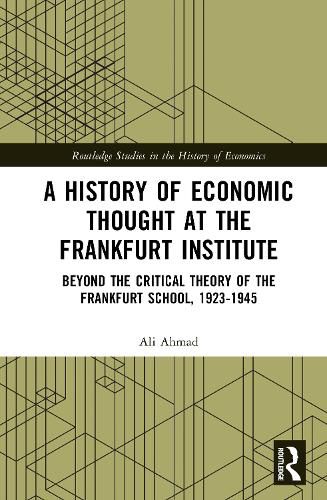Readings Newsletter
Become a Readings Member to make your shopping experience even easier.
Sign in or sign up for free!
You’re not far away from qualifying for FREE standard shipping within Australia
You’ve qualified for FREE standard shipping within Australia
The cart is loading…






The Frankfurt Institute continues to command the interest of a wide range of scholars working in history, philosophy, sociology, and political science. Yet, the prevailing narrative about the Institute overlooks a crucial component of its history: the economic theories developed by its lesser-known members. This book presents the first comprehensive study of these overlooked contributions, providing a transformative account that repositions the Institute as a site of original and influential economic thought. Most research on the Frankfurt Institute remains narrowly focused on a select few members whose work developed methods of critiquing capitalism that were more philosophically oriented than empirically grounded in economic reality.
Drawing on new archival research, this book brings to the forefront the sidelined and long-neglected economic ideas of Franz L. Neumann, Otto Kirchheimer, Friedrich Pollock, Carl Gruenberg, Henryk Grossmann, Arkadij Gurland, Gerhard Meyer, Kurt Mandelbaum, and Karl A. Wittfogel. Viewing the work of the Institute through these figures highlights the fact that material, historical and empirical approaches to economic theory were central to its work. Being primarily a work of intellectual history, the book contextualises the Institute's economic theories within the historical settings of the Weimar Republic and Nazi Germany.
The book emphasises the role of these underappreciated economists in shaping economic discourse around the structural characteristics of capitalist economies during the twentieth century and offers a renewed perspective on the intricate interplay between economics, politics, history, and epistemology, which lay at the heart of the Institute's endeavours. This book will be of interest to researchers on twentieth-century economic history, intellectual history, political philosophy, history of economic thought, epistemology and Critical Theory.
$9.00 standard shipping within Australia
FREE standard shipping within Australia for orders over $100.00
Express & International shipping calculated at checkout
Stock availability can be subject to change without notice. We recommend calling the shop or contacting our online team to check availability of low stock items. Please see our Shopping Online page for more details.
The Frankfurt Institute continues to command the interest of a wide range of scholars working in history, philosophy, sociology, and political science. Yet, the prevailing narrative about the Institute overlooks a crucial component of its history: the economic theories developed by its lesser-known members. This book presents the first comprehensive study of these overlooked contributions, providing a transformative account that repositions the Institute as a site of original and influential economic thought. Most research on the Frankfurt Institute remains narrowly focused on a select few members whose work developed methods of critiquing capitalism that were more philosophically oriented than empirically grounded in economic reality.
Drawing on new archival research, this book brings to the forefront the sidelined and long-neglected economic ideas of Franz L. Neumann, Otto Kirchheimer, Friedrich Pollock, Carl Gruenberg, Henryk Grossmann, Arkadij Gurland, Gerhard Meyer, Kurt Mandelbaum, and Karl A. Wittfogel. Viewing the work of the Institute through these figures highlights the fact that material, historical and empirical approaches to economic theory were central to its work. Being primarily a work of intellectual history, the book contextualises the Institute's economic theories within the historical settings of the Weimar Republic and Nazi Germany.
The book emphasises the role of these underappreciated economists in shaping economic discourse around the structural characteristics of capitalist economies during the twentieth century and offers a renewed perspective on the intricate interplay between economics, politics, history, and epistemology, which lay at the heart of the Institute's endeavours. This book will be of interest to researchers on twentieth-century economic history, intellectual history, political philosophy, history of economic thought, epistemology and Critical Theory.